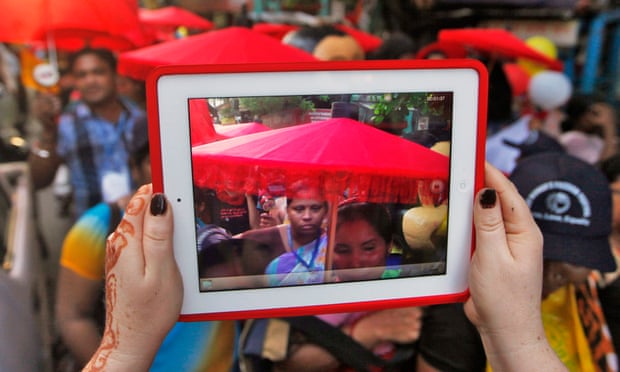- UID
- 20
- Online time
- Hours
- Posts
- Reg time
- 24-8-2017
- Last login
- 1-1-1970
|
Legislation designed to protect trafficking victims ignores workers who enter sex trade voluntarily, critics warn.

A protester in Sonagachi, Kolkata, in the Indian state of West Bengal, photographs a rally promoting greater freedom for sex workers. Photograph: Rupak de Chowdhuri/Reuters
▼ Sex workers in New Delhi’s red light district have reacted with fury to new anti-trafficking legislation that they believe will penalise them.
The Trafficking of Persons (Prevention, Protection and Rehabilitation) bill, which is set to become law after being passed last month by parliament, seeks to prevent, rescue and rehabilitate people who have been trafficked.
But sex workers based in one of the brothels of GB Road in the Indian capital said the bill made no distinction between women who are trafficked and coerced into sex work, and those who choose to do it.
“No one has forced me to do this. I do it because it pays better than being a maid or factory worker,” said Sanjana Murali (name changed), a 32-year-old sex worker. “But with this law, if the police raid akotha[brothel], I will be taken into police custody and sent to a rehabilitation clinic. What about my freedom to choose?”
Murali has worked in a brothel for nine years, since she arrived in Delhi from a village near Hyderabad, in the country’s south. Most of the money she earns goes back to her family in the village.
“I don’t want government help. I do sex work because I have two children, parents and two brothers to support. If the state thinks I should be ‘rescued’ and trained to sew clothes or makepapar(papadams) to survive, it is wrong. That kind of work will never pay enough,” said Murali.
Critics of the bill concede the legislation will work as an anti-trafficking measure, but believe its conflation of trafficked sex workers with consenting sex workers will lead to the harassment and intimidation of voluntary sex workers by police.
When Shashi Tharoor, an Indian MP, raised this point in parliament, he was assured by Maneka Gandhi, the minister for women, that the bill would not target voluntary sex workers.
“That’s just her word,” said Dr Smarajit Jana of the DurbarMahila Samanwaya Committee, a collective of 65,000 sex workers in West Bengal. “Why isn’t there a single sentence in the bill stating that? All the bill does is empower the police to harass sex workers and disempower the women themselves.”
Jana said the government failed to appreciate that most voluntary sex workers have children to raise and onerous family commitments.
Sex workers are typically the “heads” of their extended families. Their income pays for food, rent, a relative’s illness, and the school fees of their children, and those of their siblings.
Jana also criticised the new legislation’s “raid-rescue-rehabilitation” model for tackling trafficking. Under the bill, the police, on hearing of trafficked women or children being forced into sex work, will raid a brothel, “rescue” the victims, and send them to rehabilitation centres.
“When you put them into a rehabilitation clinic, who is going to look after their children? You can’t separate mothers from their children. The bill is going to make life worse for sex workers,” said Jana.
For Kusum, who is president of the All IndiaNetwork of Sex Workers and goes by only one name, the bill is based on paternalistic assumptions about rescuing sex workers. She said no union or organisation was consulted in the drafting of the bill, even though sex workers are well-organised.
In June, more than 4,000 sex workers wrote to Gandhi voicing their concerns about the bill, but received no response.
Kusum only heard about the bill a couple of months ago. “I happen to know how to use the internet and heard about it. But there are millions of sex workers out there who have no idea what is going to hit them,” she said.
Asmita Basu, programmes director at Amnesty International India, also opposed the bill in its present from. “The bill has several provisions that are overboard and disproportionate, which may infringe upon human rights of individuals,” she said.
Recent allegations of sex abuseat shelters and care homes across Delhi and in other parts of the country, run by the government and NGOs, have also heightened concerns about the safety of rescued women and where they will be sent for rehabilitation.
On Monday, Gandhi said the care home scandalwas “not only frightening, it makes me sad. I know there will be many more [cases of abuse] because, for years and years, we have paid no attention, apart from giving them money.”
► Source |
|